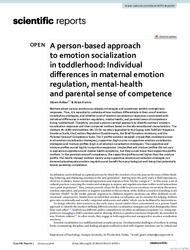A person-based approach to emotion socialization in toddlerhood: Individual differences in maternal emotion regulation, mental-health and parental sense of competence
| dc.contributor.author | Arıkan, Gizem | |
| dc.contributor.author | Kumru, Asiye | |
| dc.date.accessioned | 2023-11-02T10:30:21Z | |
| dc.date.available | 2023-11-02T10:30:21Z | |
| dc.date.issued | 2023-08-21 | |
| dc.identifier.issn | 2045-2322 | en_US |
| dc.identifier.uri | http://hdl.handle.net/10679/8926 | |
| dc.identifier.uri | https://www.nature.com/articles/s41598-023-40850-x | |
| dc.description.abstract | Mothers adopt various emotion socialization strategies and sometimes exhibit contradictory responses. Thus, it is essential to understand how mothers differentiate in their use of emotion socialization strategies, and whether a set of emotion socialization responses is associated with individual differences in emotion regulation, mental health, and parental sense of competence during toddlerhood. Therefore, we used a person-centred approach to identify mothers’ emotion socialization responses and then compared mothers based on the aforementioned characteristics. The mothers (N = 680) with toddlers (M = 23.56 months) responded to the Coping with Toddlers’ Negative Emotions Scale, the Emotion Regulation Questionnaire, the Brief Symptom Inventory, and the Parental Sense of Competence Scale. The 3-profile-solution revealed: Unspecified (moderate scores in all emotion socialization strategies), supportive (high scores in supportive emotion socialization strategies) and mixture profiles (high in all emotion socialization strategies). The supportive and mixture profiles scored highly in cognitive reappraisal. Unspecified and mixture profiles did not vary in expressive suppression and mental health symptoms, but they scored lower than supportive profile mothers. In the parental sense of competence, the supportive profile scored higher than the mixture profile. The results showed mothers mainly using supportive emotion socialization strategies can demonstrate adequate emotion regulation and benefit from psychological well-being that potentially boosts parenting competence. | en_US |
| dc.description.sponsorship | TÜBİTAK | |
| dc.language.iso | eng | en_US |
| dc.publisher | Nature Research | en_US |
| dc.relation | info:turkey/grantAgreement/TUBITAK/114K813 | |
| dc.relation.ispartof | Scientific Reports | |
| dc.rights | openAccess | |
| dc.rights | Attribution 4.0 International | |
| dc.rights.uri | https://creativecommons.org/licenses/by/4.0/ | |
| dc.title | A person-based approach to emotion socialization in toddlerhood: Individual differences in maternal emotion regulation, mental-health and parental sense of competence | en_US |
| dc.type | Article | en_US |
| dc.description.version | Publisher version | en_US |
| dc.relation.journal | Article - International Refereed Journal - Institutional Academic Staff | |
| dc.peerreviewed | yes | en_US |
| dc.publicationstatus | Published | en_US |
| dc.contributor.department | Özyeğin University | |
| dc.contributor.authorID | (ORCID 0000-0003-2961-6426 & YÖK ID 124683) Arıkan, Gizem | |
| dc.contributor.authorID | (ORCID 0000-0002-1514-4248 & YÖK ID 127458) Kumru, Asiye | |
| dc.contributor.ozuauthor | Arıkan, Gizem | |
| dc.contributor.ozuauthor | Kumru, Asiye | |
| dc.identifier.volume | 13 | en_US |
| dc.identifier.issue | 1 | en_US |
| dc.identifier.wos | WOS:001054205700054 | |
| dc.identifier.doi | 10.1038/s41598-023-40850-x | en_US |
| dc.identifier.scopus | SCOPUS:2-s2.0-85168435535 | |
| dc.relation.publicationcategory | Article - International Refereed Journal - Institutional Academic Staff |
Files in this item
This item appears in the following Collection(s)
Share this page




